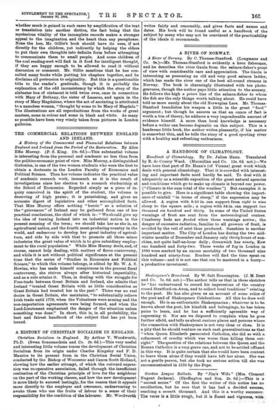THE COMMERCIAL RELATIONS BETWEEN ENGLAND AND IRELAND.
A History of the Commeroial and Financial Relations between England and Ireland from the Period of the Restoration. By Alice Effie Murray. (P. S. King. 10s. 6d.)—This substantial volume is interesting from the personal and academic no less than from the politico-economic point of view. Miss Murray, a distinguished Girtonian, is one of the two women students who were the first to obtain a doctorate in the London Faculty of Economics and Political Science. Then her volume indicates the practical value of academic research work, inasmuch as it is the result of investigations since her election to a research studentship at the School of Economics. Regarded simply as a piece of in- quiry conceived in the spirit of the student, the volume is deserving of high praise; it is painstaking, and gives an accurate digest of legislative and other accomplished facts. That Miss Murray offers nothing " heroic " as a solution of the "grievances" of Ireland may be gathered from one of her practical conclusions, the chief of which is : "We should give up the idea of turning Ireland into an industrial nation in the present meaning of the term ; we should take her as she is, an agricultural nation, and the fourth meat-producing country in the world, and endeavour to develop her great industry of agricul- ture, and side by side with that to promote all those minor industries the great value of which is to give subsidiary employ- ment to the rural population." While Miss Murray deals, and, of course, cannot help dealing, with matters of fierce controversy, and while it is not without political significance at the present time that the series of "Studies in Economics and Political Science," to which this volume belongs, is edited by Mr. W. A. S. Hewins, who has made himself conspicuous in the present fiscal controversy, she strives always after historical impartiality, and as a rule attains it. Thus, in dealing with the struggle for Free-trade between Great Britain and Ireland, she admits that Ireland "treated Great Britain with as little consideration as Great Britain had treated her in the past." There was no real desire in Great Britain, she maintains, "to substantially relieve Irish trade until 1779, when the Volunteers were arming and the non-importation agreements were being formed, and when the Lord-Lieutenant emphasized the danger of the situation unless something was done." In short, this is, in all probability, the best and fairest handbook of the subject that has yet been issued.






















































 Previous page
Previous page